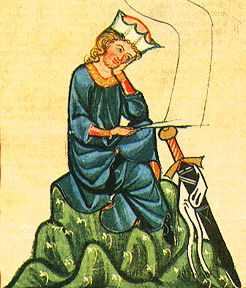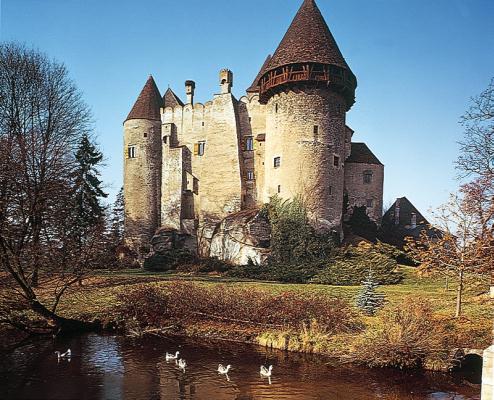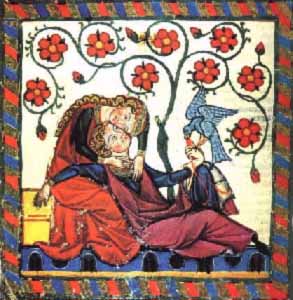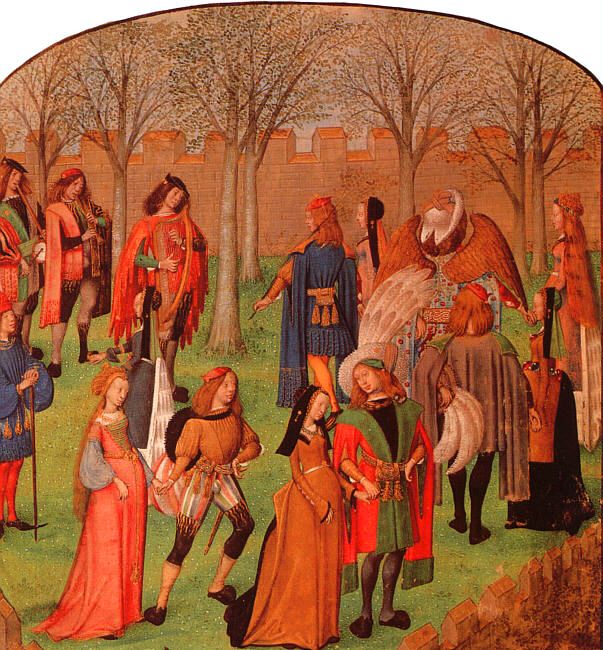 |
|

Walther von der Vogelweide lived from 1170 to 1235 and was one of the
Minnesingers -- poets who travelled from court to court, composing verses mainly on the subject of pure, idealized
love ("Minne" in medieval German. They were similar to troubadours in France but unlike the latter were mostly of noble birth).
Walther's greatness lies in the fact that he did not allow himself to be limited to the form of a typical minnesong.
Abandoning the stilted formulas, he went beyond the conventional theme of pure love- a disconnected ideal which no one
could relate to -- and wrote instead of his own feelings, thoughts, and concerns, at the same time reviving the lyrical
quality of the language itself. His poems are thus very individual and come from the heart, whether they are meditations on
the global issues of humanity ("I sat on a Stone") or naughty little folk songs ("Under the Linden").
|
|
Preserve Me From Sorrow
Lord God, preserve me from sorrow,
And set me free from care.
the joys of others I would borrow,
And make them twice as fair.
Give me a little joy and I'll find more.
I know where lies a wondrous store,
Whereof I trust, with patient art,
To win myself a part.
My joys are locked in the keeping
Of one that is endowed
With grace and beauty so exceeding,
To serve her all were proud.
I'd win a little laughter from her lips,
If she would deign to hear my quips;
And what hindrance could there be?
Her goodness heartens me.
But what if she see me gazing,
And call me to her side?
She sets my senses mazing,
My limbs are petrified.
I had just now such nimble words in mind;
But when her eyes on me inclined,
Forgot them all in my dismay.
What did I wish to say?
|
|
 |
 |
 |
 |
|

I Sat Upon a Stone
I sat upon a stone
One leg across the other thrown,
One hand I propped my elbow in,
And in the other hand, my chin
And half my cheek was hidden.
With heavy thoughts my mind was ridden;
How best we in this world should live.
There was no answer I could give,
To set three things together,
That none should hurt another.
The two are honor and worldly gain,
that often work each other's bane.
The third is God, His grace,
that takes the highest place.
I wished them all within one shrine.
It could not be, vain wish of mine,
That honor and possession,
And grace, without division,
Should be within one heart united:
The one or other will be blighted.
See, treason in the alley waits,
And Might is captain of the streets.
Peace grovels sick, Right is repealed.
the three be none the safe on Earth, unless the two are fully healed.
|
|
 |
 |
 |
|
|
 |
|
The Poet Says Farewell to Winter
The World was dressed in green array,
With red and blue and yellow spray.
The little birds each sang his lay,
Where
croaks the winter crow today.
Have those bright colors altered? yea,
All faded into white and grey.
We scan the landscape
with dismay.
Isat in summer cheerfully,
Where blossoms grew and greenery.
Between the river and the lea
I gathered flowers
on bended knee.
Now snow has bowed the naked tree,
And frost as far as eye can see,
That nips the birds most bitterly.
"Ah, snow fall fast!", the foolish cry.
the poor look sourly at the sky;
And heavy as a stone am I;
For three
great sorrows on me lie.
But this and that I could defy,
And I could bid all three goodbye,
If Spring were here and
Summer nigh.
Rather than live much longer so,
For bitter crabs I would forgo
My meat. Oh, Summer, come and show
Thyself with
all thy garlands, ho!
Ah, let me bask in sun and go
To pick the blossoms as they grow.
Chase forth like straw our
surly foe.
I grow uncouth as Esau grew;
My hair is long and matted too.
I long to see the sower strew
The seed and plough
the soil anew.
Rather than sit for long and rue
In frozen state as now I do,
I'd be a monk in Toberlu.
Conquest of Self
Who is courageous, who is reliant?
Who slays the Lion, who kills the Giant?
Even he that out of the storms of passion,
Steering himself in goodly fashion,
Within the Port of Virtue casts.
And he that conquers not these dangers,
But copies virtue in front of strangers,
His light may shine, but never lasts.

|
|
 |
|
Under the Linden
Under the linden, on the heather,
For us two a bed there was.
There could you see, entwined
together,
Broken flowers and bruised grass.
From a thicket in the dale,
Tandaradei,
Sweetly sang the nightingale.
I sped thither through the glade.
My love had reached the spot before.
There was I snared, most happy maid!
For I am blessed evermore!
Many a time he kissed me there,
Tandaradei,
See my lips, how red they are!
There
he contrived in joyful haste
A bower of blossoms for us both,
That must be still a fading jest
For those who take
the selfsame path,
And see the spot where, on that day,
Tandaradei,
My head among the roses lay.
How shamed
were I if anyone
(Now Heaven forbid!) had then been nigh.
There we two lay, but that was known
To none except
my love and I
And the little nightingale,
Tandaradei,
Who, I know, will tell no tale.

*[the poem in the original:]* Under der Linden
"Under der linden
án der heide,
dâ únser zweier bette was,
dâ muget ir vinden
schône beide
gebrochen
bluomen unde gras.
vór dem walde in einem tal,
tandaradei,
schône sanc diu nahtegal.
Ich kam gegangen
zuo der ouwe:
dô was mîn friedel komen ê.
da wart ich empfangen
hêre frouwe
daz ich bin saelic iemer mê.
kuste er mich? wol tûsentstunt;
tandaradei,
séht wie rôt mir ist der munt.
Dô hete er gemachet
als
rîche
von bluomen eine bettestat.
des wirt noch gelachet
inneclîche,
kumt iemen an daz selbe pfat.
bî
den rôsen er wol mac
tandaradei,
merken wâ mirz houbet lac.
Daz er bî mir laege,
wesse ez iemen
(nu
enwélle got!), so schamte ich mich.
wes er mit mir pflaege,
niemer niemen
bevinde daz wan er und ich
und ein
kleinez vogellîn:
tandaradei,
daz mac wol getriuwe sîn.
|
|
|
|





